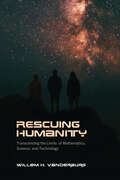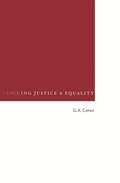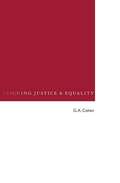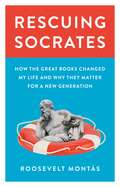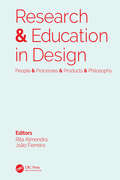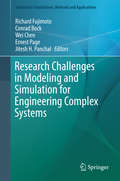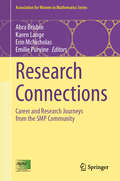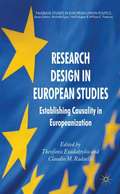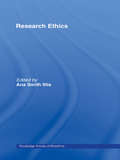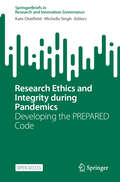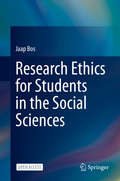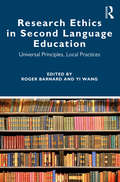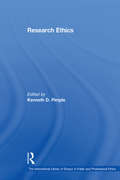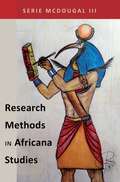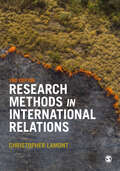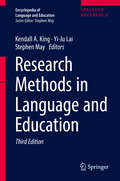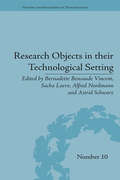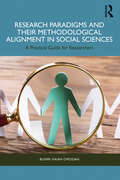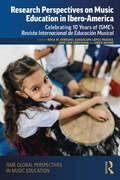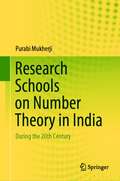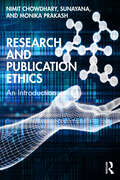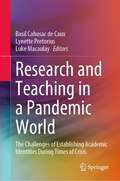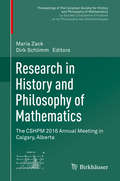- Table View
- List View
Rescuing Humanity: Transcending the Limits of Mathematics, Science, and Technology
by Willem H. VanderburgIn Rescuing Humanity, Willem H. Vanderburg reminds us that we have relied on discipline-based approaches for human knowing, doing, and organizing for less than a century. During this brief period, these approaches have become responsible for both our spectacular successes and most of our social and environmental crises. At their roots is a cultural mutation that includes secular religious attitudes that veil the limits of these approaches, leading to their overvaluation. Because their use, especially in science and technology, is primarily built up with mathematics, living entities and systems can be dealt with only as if their "architecture" or "design" is based on the principle of non-contradiction, which is true only for non-living entities. This distortion explains our many crises. Vanderburg begins to explore the limits of discipline-based approaches, which guides the way toward developing complementary ones capable of transcending these limits. It is no different from a carpenter going beyond the limits of his hammer by reaching for other tools. As we grapple with everything from the impacts of social media, the ongoing climate crisis, and divisive political ideologies, Rescuing Humanity reveals that our civilization must learn to do the equivalent if humans and other living things are to continue making earth a home.
Rescuing Justice and Equality
by G. A. CohenArguing against the Rawlsian version of a just society, Cohen demonstrates that distributive justice does not tolerate deep inequality. In the course of providing a deep and sophisticated critique of Rawlsian's theory of justice, Cohen demonstrates that questions of distributive justice arise not only for the state but also for people in their daily lives. The right rules for the macro scale of public institutions and policies also apply, with suitable adjustments, to the micro level of individual decision-making.
Rescuing Justice and Equality
by G. A. CohenIn this stimulating work of political philosophy, acclaimed philosopher G. A. Cohen sets out to rescue the egalitarian thesis that in a society in which distributive justice prevails, people’s material prospects are roughly equal. Arguing against the Rawlsian version of a just society, Cohen demonstrates that distributive justice does not tolerate deep inequality. In the course of providing a deep and sophisticated critique of Rawls’s theory of justice, Cohen demonstrates that questions of distributive justice arise not only for the state but also for people in their daily lives. The right rules for the macro scale of public institutions and policies also apply, with suitable adjustments, to the micro level of individual decision-making. Cohen also charges Rawls’s constructivism with systematically conflating the concept of justice with other concepts. Within the Rawlsian architectonic, justice is not distinguished either from other values or from optimal rules of social regulation. The elimination of those conflations brings justice closer to equality.
Rescuing Socrates: How the Great Books Changed My Life and Why They Matter for a New Generation
by Roosevelt MontásA Dominican-born academic tells the story of how the Great Books transformed his life—and why they have the power to speak to people of all backgroundsWhat is the value of a liberal education? Traditionally characterized by a rigorous engagement with the classics of Western thought and literature, this approach to education is all but extinct in American universities, replaced by flexible distribution requirements and ever-narrower academic specialization. Many academics attack the very idea of a Western canon as chauvinistic, while the general public increasingly doubts the value of the humanities. In Rescuing Socrates, Dominican-born American academic Roosevelt Montás tells the story of how a liberal education transformed his life, and offers an intimate account of the relevance of the Great Books today, especially to members of historically marginalized communities.Montás emigrated from the Dominican Republic to Queens, New York, when he was twelve and encountered the Western classics as an undergraduate in Columbia University’s renowned Core Curriculum, one of America’s last remaining Great Books programs. The experience changed his life and determined his career—he went on to earn a PhD in English and comparative literature, serve as director of Columbia’s Center for the Core Curriculum, and start a Great Books program for low-income high school students who aspire to be the first in their families to attend college.Weaving together memoir and literary reflection, Rescuing Socrates describes how four authors—Plato, Augustine, Freud, and Gandhi—had a profound impact on Montás’s life. In doing so, the book drives home what it’s like to experience a liberal education—and why it can still remake lives.
Research & Education in Design: Proceedings of the 1st International Conference on Research and Education in Design (REDES 2019), November 14-15, 2019, Lisbon, Portugal
by Rita Almendra João FerreiraDesign is about the creation of meaningful connections to solve problems and advance human wellbeing; the discipline has always explored the beneficial links between form and function, technology and meaning, beauty and utility, people and artefacts and problems and solutions, among others. This book focuses on the crucial connection between design research and design education.Contemporary society grows increasingly hyper-complex and globally competitive. This state of affairs raises fundamental questions for both Design Education and Design Research: Should research skills be integrated into undergraduate courses? How can we modify design courses without compromising the positive aspects of the educational studio experience? Can the three cycles of higher education in design be combined into a creative and inquisitive educational continuum?To examine the relationship between research and education in Design we must address the topic of knowledge, keeping in mind that the development and dissemination of new and useful knowledge is the core purpose of a University. If we agree that design has its own things to know and ways to find out about them, then design knowledge resides in people, processes, products, and philosophy. This book explores the intersection of these four areas with the aim of uncovering insights to advance the current state of the design discipline.
Research Challenges in Modeling and Simulation for Engineering Complex Systems (Simulation Foundations, Methods and Applications)
by Wei Chen Richard Fujimoto Conrad Bock Ernest Page Jitesh H. PanchalThis illuminating text/reference presents a review of the key aspects of the modeling and simulation (M&S) life cycle, and examines the challenges of M&S in different application areas. The authoritative work offers valuable perspectives on the future of research in M&S, and its role in engineering complex systems. Topics and features: reviews the challenges of M&S for urban infrastructure, healthcare delivery, automated vehicle manufacturing, deep space missions, and acquisitions enterprise; outlines research issues relating to conceptual modeling, covering the development of explicit and unambiguous models, communication and decision-making, and architecture and services; considers key computational challenges in the execution of simulation models, in order to best exploit emerging computing platforms and technologies; examines efforts to understand and manage uncertainty inherent in M&S processes, and how these can be unified under a consistent theoretical and philosophical foundation; discusses the reuse of models and simulations to accelerate the simulation model development process. This thought-provoking volume offers important insights for all researchers involved in modeling and simulation across the full spectrum of disciplines and applications, defining a common research agenda to support the entire M&S research community.
Research Connections: Career and Research Journeys from the SMP Community (Association for Women in Mathematics Series #36)
by Karen Lange Erin McNicholas Abra Brisbin Emilie PurvineWhat does math research really look like? Which subfield is right for me? Do people like me go to graduate school, and succeed? This book provides students a “sneak preview” of math research in a variety of subfields. Each chapter features the work of a different mathematician along with enough background material for an advanced undergraduate or early graduate student to understand the key ideas and get a sense for the styles of thinking involved in each subfield. Each chapter is prefaced by a short biography of the mathematician who wrote the chapter (all people connected to the Carleton College Summer Math Program for Women), providing advice and examples of paths from undergraduate education, through graduate school and beyond. This book provides a source of ideas and starting points for in-class projects, independent studies, and student talks as well as supplementary reading in courses. The profiles of early career mathematicians and statisticians at the beginning of each chapter are valuable as an advising resource for students considering graduate school, or to show students a diverse view of modern mathematicians in a “Math for Liberal Arts”-style course.
Research Design in European Studies
by Theofanis Exadaktylos Claudio M. RadaelliA seminal text in European studies, which addresses issues of research design and causal analysis. The chapters draw on different methodological traditions, notions of causality, and methods and use strong research design to address substantive problems in public policy, party politics, foreign policy and legislative studies.
Research Ethics (Routledge Annals of Bioethics #Vol. 1)
by Ana Smith IltisMedicine in the twenty-first century is increasingly reliant on research to guarantee the safety and efficacy of medical interventions. As a result, the need to understand the ethical issues that research generates is becoming essential. This volume introduces the principal areas of concern in research on human subjects, offering a framework for understanding research ethics, and the relationship between ethics and compliance. Research Ethics brings together leading scholars in bioethics and the topics covered include the unique concerns that arise in specific areas of research such as gene therapy and stem cell research. Individual chapters also address the ethical issues that occur when conducting research with specific populations such as infants or adolescents, and the volume looks at important emerging questions in human subjects research, namely financial conflicts of interest and the interpretation of scientific data.
Research Ethics and Integrity During Pandemics: Developing the PREPARED Code (SpringerBriefs in Research and Innovation Governance)
by Kate Chatfield Michelle SinghThis open-access book is an essential read for anyone interested in pandemic preparedness, research governance, and the ethical oversight of research. It examines the development of a pioneering research ethics framework designed for use during pandemics, guiding readers through the careful development of the PREPARED Code, while highlighting the key steps and lessons learned. The book also underscores the importance of supportive measures, such as user-friendly ethics training, to ensure effective implementation. Drawing from these insights, it offers recommendations for others seeking to develop their own clear, engaging, and accessible ethics code.
Research Ethics for Students in the Social Sciences
by Jaap BosThis open access textbook offers a practical guide into research ethics for undergraduate students in the social sciences. A step-by-step approach of the most viable issues, in-depth discussions of case histories and a variety of didactical tools will aid the student to grasp the issues at hand and help him or her develop strategies to deal with them. This book addresses problems and questions that any bachelor student in the social sciences should be aware of, including plagiarism, data fabrication and other types of fraud, data augmentation, various forms of research bias, but also peer pressure, issues with confidentiality and questions regarding conflicts of interest. Cheating, ‘free riding’, and broader issues that relate to the place of the social sciences in society are also included. The book concludes with a step-by-step approach designed to coach a student through a research application process.
Research Ethics in Second Language Education: Universal Principles, Local Practices
by Roger Barnard Yi WangThis book makes a fresh contribution to the field of research ethics by considering research issues through relatable autobiographical narratives. The book’s core offers narratives by novice second language education researchers who are completing PhD degrees using data from international research participants. These narratives expose challenges regarding the ethical identity of researchers working across diverse value and belief systems. The narrative chapters are followed by four chapters of commentaries from a line-up of international scholars with various academic, linguistic, and cultural backgrounds. The case study approach reports the experiences and reflections of research students before, during, and after the data collection phase of their projects, and offers insights into the recruitment of participants; acquiring and maintaining access; interpretations of the notion of informed consent; incentivising participants; the implications of ensuring anonymity and confidentiality; the right to withdraw participation and data; the positioning of the researcher as insider or outsider; potential conflicts of interest; the potential harm to participants and researcher; and the dissemination of findings. This practical and relatable book is aimed at research students and their supervisors in fields such as applied linguistics and education, as well as those following methods courses, to help illustrate the ethical challenges faced by researchers in the process of collecting qualitative data.
Research Ethics: A Special Issue Of Ethics And Behavior (The International Library of Essays in Public and Professional Ethics)
by Kenneth D. PimpleThis volume includes more than 40 important articles on integrity and misconduct, biomedical research, the social and disciplinary contexts of science, research in the social sciences, the social responsibility of science and scientists, and other core issues in research ethics. A new introduction by the editor places these articles in their historical and conceptual context. The volume provides a rich library of resources, ideas and challenges in the ethics of research for any scholar concerned with such issues.
Research Methods in Africana Studies
by Serie McDougalResearch Methods in Africana Studies is a major contribution to the discipline of Africana studies and social science involving people of African descent in general. This textbook is the first of its kind, offering instruction on how to conduct culturally relevant critical research on Africana communities in the American context, in addition to the African diaspora. It contains a collection of the most widely used theories and paradigms designed for exploring, explaining, and advancing Africana communities through science. The relevance, strengths, and weaknesses of every major method of data collection are explained as they relate to the lived experiences of the Black world. It stands alone as the only textbook that details empirical methods in the service of the collective advancement of Africana peoples.
Research Methods in Africana Studies
by Serie McDougal IIIThe revised edition of Research Methods in Africana Studies is a major contribution to the discipline of Africana studies and social science involving people of African descent in general. The first edition was the first of its kind, offering instruction on how to conduct culturally relevant critical research on Africana communities in the American context, in addition to the African diaspora. The revised edition contains a collection of the most widely used theories and paradigms designed for exploring, explaining, and advancing Africana communities through science. The relevance, strengths, and weaknesses of every major method of data collection are explained as they relate to the lived experiences of the Black world. It stands alone as the only textbook that details empirical methods in the service of the collective advancement of Africana peoples.
Research Methods in International Relations
by Christopher LamontThe only guide to conducting research in International Relations. Covering the full breadth of methods in IR with unrivalled clarity, this best-selling textbook takes you through the entire process of doing research, from honing your question to writing up the dissertation. The engaging and jargon-free style demystifies the process of doing research, whilst helping you develop a comprehensive understanding of the strengths and limitations of different methods and methodologies. This second edition comes with new chapters on conducting interviews and discourse analysis, as well as expanded coverage of qualitative and quantitative methods. Packed with examples, it explores the breadth of IR research today, from the long-lasting impact of colonialism to migration policy; climate change negotiations to international aid. Covering the most cutting-edge methodological developments, including critical realism, feminist, and postcolonial approaches, it helps you understand and apply research methods in world politics. This practical introduction is essential reading for anyone setting out on their International Relations research project for the first time, at undergraduate and postgraduate levels. Christopher Lamont is Assistant Dean of E-Track Programs and Associate Professor of International Relations at Tokyo International University, Japan.
Research Methods in International Relations
by Christopher LamontThe only guide to conducting research in International Relations. Covering the full breadth of methods in IR with unrivalled clarity, this best-selling textbook takes you through the entire process of doing research, from honing your question to writing up the dissertation. The engaging and jargon-free style demystifies the process of doing research, whilst helping you develop a comprehensive understanding of the strengths and limitations of different methods and methodologies. This second edition comes with new chapters on conducting interviews and discourse analysis, as well as expanded coverage of qualitative and quantitative methods. Packed with examples, it explores the breadth of IR research today, from the long-lasting impact of colonialism to migration policy; climate change negotiations to international aid. Covering the most cutting-edge methodological developments, including critical realism, feminist, and postcolonial approaches, it helps you understand and apply research methods in world politics. This practical introduction is essential reading for anyone setting out on their International Relations research project for the first time, at undergraduate and postgraduate levels. Christopher Lamont is Assistant Dean of E-Track Programs and Associate Professor of International Relations at Tokyo International University, Japan.
Research Methods in Language and Education
by Stephen May Kendall A. King Yi-Ju LaiIn this third, fully revised edition, the 10 volume Encyclopedia of Language and Education offers the newest developments, including an entirely new volume of research and scholarly content, essential to the field of language teaching and learning in the age of globalization. In the selection of topics and contributors, the Encyclopedia reflects the depth of disciplinary knowledge, breadth of interdisciplinary perspective, and diversity of socio-geographic experience in the language and education field. Throughout, there is an inclusion of contributions from non-English speaking and non-western parts of the world, providing truly global coverage. Furthermore, the authors have sought to integrate these voices fully into the whole, rather than as special cases or international perspectives in separate sections. The Encyclopedia is a necessary reference set for every university and college library in the world that serves a faculty or school of education, as well as being highly relevant to the fields of applied and socio-linguistics. The publication of this work charts the further deepening and broadening of the field of language and education since the publication of the first edition of the Encyclopedia in 1997 and the second edition in 2008.
Research Objects in their Technological Setting (History and Philosophy of Technoscience)
by Alfred Nordmann Astrid Schwarz Sacha Loeve Bernadette Bensaude VincentWhat kind of stuff is the world made of? What is the nature or substance of things? These are ontological questions, and they are usually answered with respect to the objects of science. The objects of technoscience tell a different story that concerns the power, promise and potential of things – not what they are but what they can be. Seventeen scholars from history and philosophy of science, epistemology, social anthropology, cultural studies and ethics each explore a research object in its technological setting, ranging from carbon to cardboard, from arctic ice cores to nuclear waste, from wetlands to GMO seeds, from fuel cells to the great Pacific garbage patch. Together they offer fascinating stories and novel analytic concepts, all the while opening up a space for reflecting on the specific character of technoscientific objects. With their promise of sustainable innovation and a technologically transformed future, these objects are highly charged with values and design expectations. By clarifying their mode of existence, we are learning to come to terms more generally with the furniture of the technoscientific world – where, for example, the 'dead matter' of classical physics is becoming the 'smart material' of emerging and converging technologies.
Research Paradigms and Their Methodological Alignment in Social Sciences: A Practical Guide for Researchers
by Bunmi Isaiah OmodanResearch Paradigms and Their Methodological Alignment in Social Sciences is a comprehensive guide addressing the common conceptions surrounding research paradigms. This practical book demystifies complex concepts, giving researchers a nuanced understanding of the significance of research paradigms. It offers detailed insights, examples, and strategies for selecting and applying appropriate research methods, aiming to enhance the rigour and impact of scholarly work.This insightful guide meticulously explores the intricacies of research paradigms in the social sciences. It begins by unravelling the concept and historical development of research paradigm, emphasising its pivotal role in shaping the research process. The book elucidates major research paradigms, including positivism, interpretivism, transformative paradigm, postcolonial indigenous paradigm, and pragmatism. Each paradigm is dissected, unveiling philosophical underpinnings, methodological designs, and critical considerations. The chapters carefully align research questions with specific paradigms through illustrative case studies, offering practical guidance for researchers at all levels. Notably, the transformative paradigm and postcolonial indigenous perspective receive dedicated attention, addressing their unique methodological nuances and ethical dimensions. The exploration extends to pragmatism, seamlessly integrating theoretical foundations with real-world applications. The book strives to bridge the awareness gap in academic settings, fostering a profound appreciation for research paradigms and promoting a thoughtful, rigorous approach to scholarly inquiry.This book caters to students, novice and experienced researchers, offering a comprehensive understanding of research paradigms. It's valuable for academia, aiding undergraduate and postgraduate students, educators, and researchers in various disciplines. Research organisations, academic institutions, and professionals in diverse fields engaged in research and development will also find it a valuable resource.
Research Perspectives on Music Education in Ibero-America: Celebrating 10 Years of ISME’s Revista Internacional de Educación Musical (ISME Series in Music Education)
by Gwen Moore Guadalupe López-Íñiguez José Luis Aróstegui Rosa M. SerranoThis volume brings together a selection of essential articles from the journal Revista Internacional de Educación Musical (RIEM), a Spanish-language journal published by the International Society for Music Education, making this work available to an English-speaking audience for the first time. With chapters representing a wide range of countries in the Ibero-American world, including Argentina, Brazil, Chile, Colombia, Mexico, Portugal, and Spain, the book aims to develop international exchange in the music education community. The book is structured around key themes, including music teacher training, youth music education, higher music education, and sociomusical programs, with a focus on opportunities for improvement across music education contexts inside and outside schools. Making vibrant research and practice from across the region available to a wider international audience, this book facilitates exchanges between researchers and educators and enhances global music education studies by highlighting groundbreaking work from Spanish- and Portuguese-speaking countries.
Research Schools on Number Theory in India: During the 20th Century
by Purabi MukherjiThis book is an attempt to describe the gradual development of the major schools of research on number theory in South India, Punjab, Mumbai, Bengal, and Bihar—including the establishment of Tata Institute of Fundamental Research (TIFR), Mumbai, a landmark event in the history of research of number theory in India. Research on number theory in India during modern times started with the advent of the iconic genius Srinivasa Ramanujan, inspiring mathematicians around the world. This book discusses the national and international impact of the research made by Indian number theorists. It also includes a carefully compiled, comprehensive bibliography of major 20th century Indian number theorists making this book important from the standpoint of historic documentation and a valuable resource for researchers of the field for their literature survey. This book also briefly discusses the importance of number theory in the modern world of mathematics, including applications of the results developed by indigenous number theorists in practical fields. Since the book is written from the viewpoint of the history of science, technical jargon and mathematical expressions have been avoided as much as possible.
Research and Publication Ethics: An Introduction
by Nimit Chowdhary Sunayana Monika PrakashThis book provides a comprehensive overview of research and publication ethics and guides young researchers on how to conduct ethical research and publish their work responsibly. It presents an understanding of ethical practices in research and how they apply to research and publication by examining the different ethical theories and their application. The book also discusses the different factors influencing ethical decision-making and probes into the ethical issues that can arise in the research process. It explores the different forms of scientific misconduct, such as data fabrication and falsification, plagiarism, and conflicts of interest, and provides strategies for ethical research. The book also details the impact of scientific misconduct on research and publication and the strategies for preventing and detecting misconduct.Aligning to the belief that promoting ethical research practices is essential for advancing science and society, this book will be helpful for young researchers, scholars, aspiring researchers, and academicians interested in ethical research practices in multiple disciplines.
Research and Teaching in a Pandemic World: The Challenges of Establishing Academic Identities During Times of Crisis
by Lynette Pretorius Luke Macaulay Basil Cahusac de CauxThis book adopts collaborative autoethnography as its methodology, and presents the collective witnessing of experiences of the COVID-19 pandemic within the higher education sector. Through the presentation of staff and student experiences and what was learnt from them, the authors examine the global phenomenon that is the COVID-19 pandemic through the purposeful exploration of their own experiences. This book presents an overall argument about the state of higher education in the middle of the pandemic and highlights academic issues and region-specific challenges. The reflections presented in this book offer insights for other staff and students, as well as academic policy-makers, regarding the pandemic experiences of those within academia. It also offers practical suggestions as to how we as a global community can move forward post-pandemic.
Research in History and Philosophy of Mathematics
by Maria Zack Dirk SchlimmThis volume contains seventeen papers that were presented at the 2015 Annual Meeting of the Canadian Society for History and Philosophy of Mathematics/La Soci#65533;t#65533; Canadienne d'Histoire et de Philosophie des Math#65533;matiques, held in Washington, D. C. In addition to showcasing rigorously reviewed modern scholarship on an interesting variety of general topics in the history and philosophy of mathematics, this meeting also honored the memories of Jacqueline (Jackie) Stedall and Ivor Grattan-Guinness; celebrated the Centennial of the Mathematical Association of America; and considered the importance of mathematical communities in a special session. These themes and many others are explored in these collected papers, which cover subjects such as New evidence that the Latin translation of Euclid's Elements was based on the Arabic version attributed to al-Ḥajjāj Work done on the arc rampant in the seventeenth century The history of numerical methods for finding roots of nonlinear equations An original play featuring a dialogue between George Boole and Augustus De Morgan that explores the relationship between them Key issues in the digital preservation of mathematical material for future generations A look at the first twenty-five years of The American Mathematical Monthly in the context of the evolving American mathematical community The growth of Math Circles and the unique ways they are being implemented in the United States Written by leading scholars in the field, these papers will be accessible to not only mathematicians and students of the history and philosophy of mathematics, but also anyone with a general interest in mathematics.
